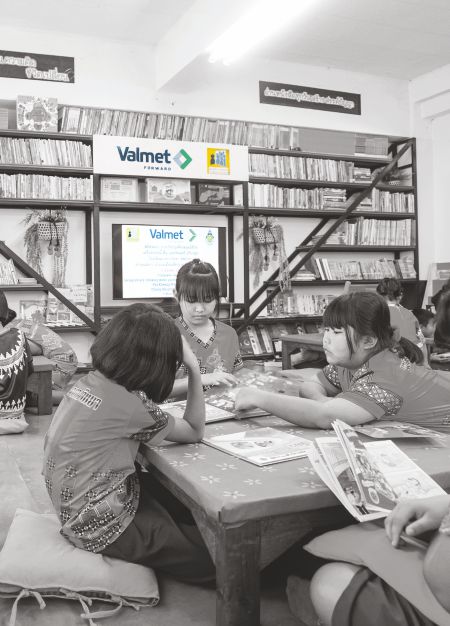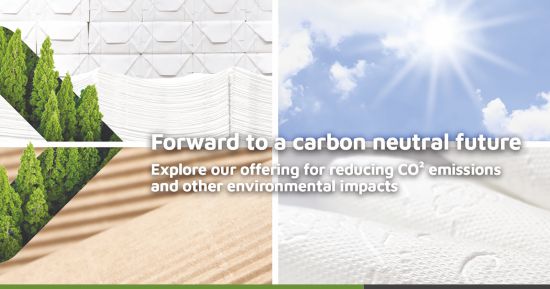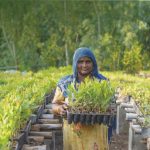Leading global developer and supplier of technologies, automation and services for the pulp, paper and energy industries, Valmet Oyj, has enabled 100 percent carbon neutral production for its pulp, paper, board, and tissue customers. In a recent interaction with Paper Mart magazine, Valmet talked about its global sustainable business practices, climate program, social responsibility program, and its positioning in the sustainability assessment.

Enhancing Sustainable Business Practices Globally
Sustainability is at the core of Valmet’s business strategy and operations. Our values, code of conduct & related policies, and selected globally acknowledged initiatives & principles create the foundation for sustainable performance at Valmet.
Sustainability is integrated in our processes through the comprehensive Sustainability360° Agenda, which includes environmental, social and governance perspectives (ESG) to sustainability, aligned with the United Nations (UN) Sustainable Development Goals (SDGs), and executed as part of Valmet’s annual planning process.
Climate Program
Valmet believes that technology plays a key role in mitigating climate change and global warming in the transition to a carbon neutral economy. This is why we have created an ambitious climate program − Forward to a carbon neutral future − that includes ambitious CO₂ emission reduction targets and concrete actions for the whole value chain, including the supply chain, our own operations, and customers’ use of our technologies.
Valmet has validated science-based CO₂ emissions reduction targets and concrete actions for the whole value chain. Valmet contributes to this goal by offering bioenergy self-sufficient chemical pulp mills and enabling carbon neutral biomass-based heat and power production. In 2021, we set the target of enabling 100 percent carbon-neutral pulp and paper production for customers by 2030 and in 2023, we reached that target seven years in advance.
In addition, our target is to reduce CO₂ emissions by 80 percent in our own operations and 20 percent in our supply chain by 2030. In Valmet’s own operations, emissions from fuels, heating and electricity in Valmet’s office and production units around the world have decreased by 51 percent since the baseline year 2019. During 2023, all electricity in Finland and Sweden, representing 60 percent of Valmet’s total consumption, was purchased as carbon neutral. In our supply chain, Valmet’s absolute CO₂ emissions from direct purchased goods and services decreased by 22 percent in 2023.
Watch: Top Paper Companies 2023
From Renewable Resources into Sustainable Results
Valmet’s mission is to convert renewable resources into sustainable results. This means that our technology and services make it possible for our customers to manufacture sustainable products from renewable resources.
Valmet has a long track record in providing solutions that convert biomass into renewable energy and recyclable products such as pulp, paper, board and tissue. We have also developed and commercialized new biomass conversion technologies for producing new bio-based end products such as biogas, biofuels and biomaterials. In India, we are executing projects comprising the BioTrac™ biomass pretreatment system for biomass to ethanol application. With this technology, waste material such as rice straw can be utilized to produce climate-friendly biofuels.
At Valmet, we focus on always finding the technically and economically best air emission control solutions for our customers. An optimal solution provides the highest environmental performance and ability to meet the set emission limits. Additionally, it significantly improves energy and process efficiency. For instance in India, we have been selected to design and supply Flue Gas Desulfurization (FGD) for a petroleum refinery’s four boilers, which are located in the western part of India. The solution will help to reduce emissions and meet the new emission norms regulated by the Ministry of Environment, Forests and Climate Change (MoEF & CC). The delivery is scheduled to be completed in the third quarter of 2024.

Valmet’s technologies also play a vital role in efficient water management, e.g. evaporation & condensate treatment solutions, ultrafiltration solutions & tissue, and board & paper machines can help customers to recycle processed water and reduce freshwater use & water pollution. For example, Naini Papers Limited, Kashipur Mill in India is a showcase of reducing freshwater consumption. Through the collaboration with Valmet, the mill manages to reduce freshwater consumption from targeted less than 9.5 to less than 9 m3 /adt. Improving water efficiency and decreasing water consumption are also part of Valmet’s environmental targets for its own operations by 2030.
Valmet-delivered Metsä Fibre Kemi bioproduct mill in Finland, which started up in 2023, is a showcase example of an energy efficient state-of-the-art mill. The steam integration between evaporation and cooking decreases the steam consumption in evaporation by about 10 percent. The pump dryers have several new features reducing energy consumption, and the energy efficient high-power recovery boiler enables the mill to produce 1.5 times more electricity than it needs for its own operations, making it 250 percent self-sufficient in electricity production.
Another example, a customer in India, which Valmet delivered a high power recovery boiler in 2021, has saved significant tonnes of coal annually thanks to the investment.
At Valmet, circularity is essential for creating a sustainable future, and the fundamental idea of circularity is embedded in our mission: Converting renewable resources into sustainable results. We are playing a strong role in the textile industry revolution and see novel cellulose-based textiles and fiber-to-fiber textile recycling as the solution for more sustainable and circular textile production. Valmet delivered key technology for refining, washing, bleaching and drying to Renewcell’s textile recycling plant in Sundsvall, Sweden, started in 2022. During 2023, the production of the plant was being ramped up, and it is planned to further increase the capacity in stages.
Also Read: Edicon Paper Product Eyes Foreign Shores, Plans to Export 50% Capacity
Social Responsibility Program
As a global company and a recognized sustainability leader in our industry, we work in a multicultural environment, where companies may have a range of potential social impacts. With operations in over 40 countries, we continue implementing social responsibility programs in all Valmet Areas through sponsorships and donations to local communities for the wellbeing of society and the environment.
In 2023, Valmet continued implementing local projects started at the end of 2022. In Thailand, we renovated facilities at three rural schools in collaboration with the Mirror Foundation to enhance children’s learning conditions.
Valmet Recognized as a Sustainability Leader
Over the years, Valmet has been recognized as a global leader in multiple rankings. In 2023, Valmet was included in the DJSI World and Europe indices for the tenth consecutive year. In 2023, Valmet received the best ranking in the MSCI ESG Ratings, a gold medal in the EcoVadis sustainability assessment and was included in S&P Global’s annual Sustainability Yearbook.

Valmet reports to the CDP, an international non-profit organization that assesses climate-related information from companies to manage their environmental impacts and to help investors better understand the financial risks and opportunities that climate change presents to their portfolio companies. Via the CDP Climate questionnaire, Valmet also reports its annual progress against its Climate Program’s CO₂ reduction targets, approved by the Science Based Targets initiative (SBTi). In 2023, Valmet received the A leadership level rating in CDP Climate.



